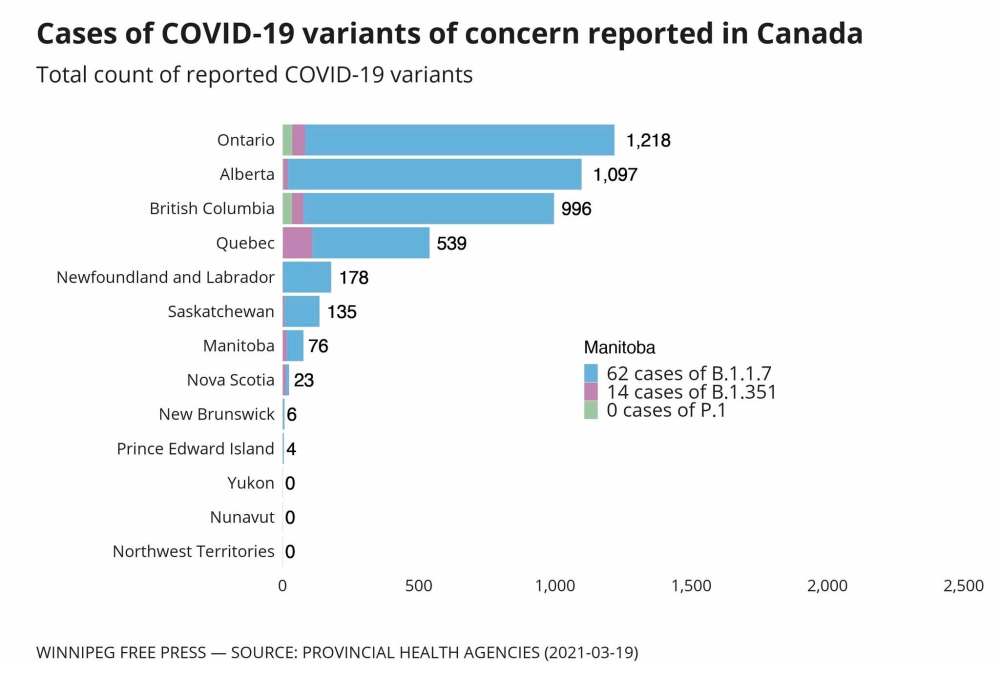Three COVID variant cases found in Manitoba schools
Read this article for free:
or
Already have an account? Log in here »
To continue reading, please subscribe:
Monthly Digital Subscription
$0 for the first 4 weeks*
- Enjoy unlimited reading on winnipegfreepress.com
- Read the E-Edition, our digital replica newspaper
- Access News Break, our award-winning app
- Play interactive puzzles
*No charge for 4 weeks then price increases to the regular rate of $19.00 plus GST every four weeks. Offer available to new and qualified returning subscribers only. Cancel any time.
Monthly Digital Subscription
$4.75/week*
- Enjoy unlimited reading on winnipegfreepress.com
- Read the E-Edition, our digital replica newspaper
- Access News Break, our award-winning app
- Play interactive puzzles
*Billed as $19 plus GST every four weeks. Cancel any time.
To continue reading, please subscribe:
Add Free Press access to your Brandon Sun subscription for only an additional
$1 for the first 4 weeks*
*Your next subscription payment will increase by $1.00 and you will be charged $16.99 plus GST for four weeks. After four weeks, your payment will increase to $23.99 plus GST every four weeks.
Read unlimited articles for free today:
or
Already have an account? Log in here »
Hey there, time traveller!
This article was published 19/03/2021 (1730 days ago), so information in it may no longer be current.
At least three cases of a highly contagious variant of the COVID-19 virus — one of which is still under investigation to determine the source of infection — have been identified in Manitoba schools.
Families at École Taché and O.V. Jewitt Community School in Winnipeg received letters Thursday informing them of exposures in their children’s schools earlier this month.
Ecole Tache COVID-19 VOC letter – March 18 2021
Deputy chief public health officer Dr. Jazz Atwal announced the cases publicly, as well as a third variant identified at Pine Ridge Elementary School in Winkler, at a news conference Friday.
The cases in Winnipeg were close contacts of another variant infection, but public-health officials are still investigating the Winkler case, Atwal said.
“It’s not unexpected,” he said. “We’re seeing an increased number of cases, we’re seeing more variants of concern from a case perspective, as well.”
Research suggests the variants that have arrived in Manitoba — the U.K (B.117) and South African (B.1.351) strains — are 30 to 50 per cent more contagious than the original strain.
Atwal said the province is taking “more aggressive measures” to mitigate the risk of variant transmission in schools, in addition to broadening the close-contact definition and introducing stricter isolation requirements.
“It’s not unexpected. We’re seeing an increased number of cases, we’re seeing more variants of concern from a case perspective, as well.” — Dr. Jazz Atwal, Deputy chief public health officer
“If there is a case within a school, even with distancing, even with mask-use and even if there was really no interactions with others in their cohort, we’re going to be asking that whole cohort, likely, to stay home,” he said, noting certain variables are still up for consideration.
O.V. Jewitt families were told in a letter dated Thursday to “closely monitor” their children for symptoms, even if they’re not considered to be close contacts.
Seven Oaks superintendent Brian O’Leary said Friday seven people had been identified as close contacts after the Maples-area elementary school exposure.
Close contacts who do not have symptoms are advised to get tested after the 10-day mark, following an exposure. Public health is expected to advise contacts, regardless of results, on the length of time they should isolate, a period that could be up to 24 days.
Much like public-health officials led all contact tracing efforts at the start of the COVID-19 pandemic, they are taking the lead on tracking variants in schools, O’Leary said.
“With non-variant cases or ‘regular’ COVID cases… schools are essentially responsible for the contact tracing,” he added.
Public health started asking school principals to get involved to speed up tracing amid a backlog in autumn. In early 2021, the province published a toolkit to support school leaders in doing investigations.
The province’s COVID-19 school dashboard indicates there have been 2,359 cases identified in schools in 2020-21.
“With non-variant cases or ‘regular’ COVID cases… schools are essentially responsible for the contact tracing.” — Brian O’Leary, Seven Oaks superintendent
Atwal said the province will adjust the charts to include specific data on variant cases, which are determined after screening and sequencing, in the future. However, it will not identify exact variants; such detailed information isn’t important, Atwal said, adding the public should focus on following public-health directives.
O’Leary said he hopes families stay calm despite the news of variants in schools, given evidence of limited community transmission in the settings.
“The weather’s been co-operating, we’re opening up windows, we’re getting kids outside more, attendance has bounced back, more kids are back from remote-learning,” he said, adding schools seem to be “bouncing back” after a year of disruptions.
maggie.macintosh@freepress.mb.ca
Twitter: @macintoshmaggie
OV Jewitt COVID-19 VOC letter - March 18 2021

Maggie Macintosh reports on education for the Winnipeg Free Press. Funding for the Free Press education reporter comes from the Government of Canada through the Local Journalism Initiative.
Our newsroom depends on a growing audience of readers to power our journalism. If you are not a paid reader, please consider becoming a subscriber.
Our newsroom depends on its audience of readers to power our journalism. Thank you for your support.
History
Updated on Friday, March 19, 2021 5:14 PM CDT: Updates final







